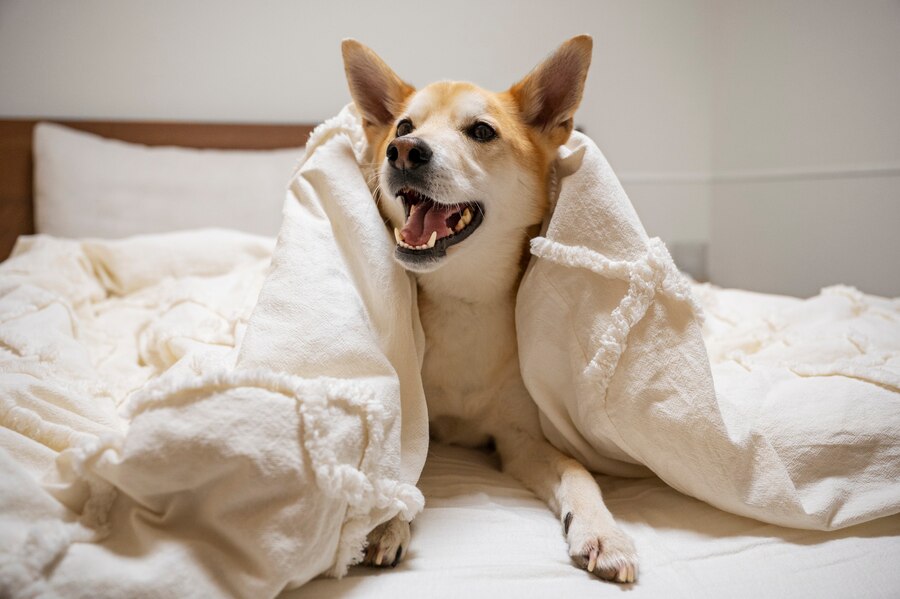Dogs have a knack for seeking out cozy, secluded spots, and if you’ve ever noticed your furry friend snoozing under your bed, you might wonder why. This behavior, while puzzling to some pet parents, is deeply rooted in a dog’s instincts and emotional needs. Let’s explore the reasons behind this habit and what it means for your canine companion.
1. Seeking Comfort and Security
Dogs are natural den animals, and enclosed spaces like the area under your bed mimic the safety and coziness of a den. This instinctual behavior provides them with a sense of protection from potential threats, even in the comfort of your home.
How to Support This Instinct
- Create a cozy, den-like space elsewhere in your home with a dog bed or crate. You can explore options like these dog bed covers or elevated dog beds to make the space more inviting.
- Use calming blankets or soft toys to make the area inviting.
2. Regulating Temperature
The space under the bed might provide a cooler or warmer spot depending on the season. Dogs are highly attuned to temperature changes and will naturally seek out areas where they feel most comfortable.
What You Can Do
- Monitor your dog’s sleeping preferences and ensure their primary sleeping area is temperature-controlled.
- Offer cooling mats in summer or heated beds in winter to make other spaces more appealing.
3. Coping with Stress or Anxiety
If your dog retreats under the bed during thunderstorms, fireworks, or busy household activities, it might be a response to stress or fear. This space acts as a safe refuge where they feel shielded from overwhelming stimuli.
Signs of Anxiety to Watch For
- Trembling or shaking
- Excessive panting or drooling
- Reduced appetite or sleep disturbances
How to Help
- Use calming products like sprays or anxiety wraps.
- Play soft, soothing music to mask external noises.
- Consult a veterinarian if anxiety persists or worsens.
- Privacy or Alone Time
Like humans, dogs sometimes crave solitude. The space under your bed offers a private retreat where they can relax undisturbed. This behavior is particularly common in dogs with independent personalities.
Encouraging Healthy Boundaries
- Respect your dog’s need for alone time but observe their behavior to ensure it’s not excessive.
- Offer alternative hiding spots to diversify their options.
5. Signs of Illness or Discomfort
Sometimes, a dog’s habit of sleeping under the bed could signal a health issue. Pain, injury, or illness might lead them to seek a quiet, enclosed space where they can rest.
When to Consult a Vet
- Sudden changes in behavior
- Limping or difficulty moving
- Signs of lethargy or discomfort
Is It Safe for Dogs to Sleep Under the Bed?
Generally, sleeping under the bed is safe for dogs. However, ensure the area is free of hazards like wires, sharp objects, or small items they could chew on. Regular cleaning can also prevent dust buildup and keep the space hygienic.
Pro Tip
If you have a pet sitter, inform them about your dog’s favorite hiding spots to avoid unnecessary worry.
How to Redirect This Behavior (If Necessary)
If you find your dog’s under-the-bed habit undesirable, here are some strategies to gently guide them elsewhere:
- Block Access
- Use barriers or storage bins to block the space under your bed.
- Create an Alternative
- Set up a comfortable dog bed in a quiet, inviting spot. Check out modern dog beds for a sleek and cozy option.
- Positive Reinforcement
- Reward your dog with treats and praise when they use their designated sleeping area.
- Crate Training
- Gradually introduce a crate as a secure sleeping space, making it cozy with blankets and toys.
Conclusion
While it might seem odd at first, your dog’s choice to sleep under the bed is often a sign of their natural instincts or emotional needs. By understanding the reasons behind this behavior and making adjustments where necessary, you can ensure your furry friend feels safe, secure, and loved.
Have questions or insights about your dog’s habits? Share them in the comments below—we’d love to hear from you!







